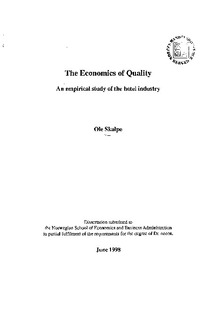The economics of quality : an empirical study of the hotel industry
Doctoral thesis
Permanent lenke
http://hdl.handle.net/11250/162542Utgivelsesdato
1998Metadata
Vis full innførselSamlinger
Sammendrag
The purpose of this study is to assess the economics of quality. Our main source of
information is customer based quality scores and detailed accounting information from
more than 500 hotels. These hotels are participants in one of the worlds largest hotel
companies. Their strategy is to offer high quality and consistent accommodations. The
chain has monitored quality and customer satisfaction for many years.
The survey provides bits and pieces of evidence related to the economics of quality.
We find that there are specific costs and sacrifices involved and that quality efforts
payoff.
The analysis does not document a direct link between quality and cost items reflecting
wages, maintenance and housekeeping. We concluded that these items are disturbed
by mismanagement and waste - neither of which are beneficial to the quality ratings.
However, we did document a positive association between the cost related to the
breakfast ingredients and the customers' perception of the breakfast serving. We hold
that more refilled quality cost measures will further expose the costs of quality.
Finally, we discovered a strong relationship between the age of the property and the
quality perceptions related to physical assets. This result indicates that investments
and maintenance are necessary resources in a quality strategy. Quality is not free.
We failed to document a significant direct connection from quality to economic
performance. This does not entail that the link is absent. Omitted variables are a more
tempting explanation. Besides, we found a significant and positive relationship
between customers' quality perceptions and revenue per room compared to the
closest competitor. We also detected higher growth rates in hotels of superior quality.
These results support our faith in quality as a profitable strategy.
The economics of quality is not a simple matter. Previous research is dominated by
convincing case studies and well written anecdotes. It is complicated to capture and
isolate the problem empirically.
The hotel companies in our survey produce high and stable quality. Nevertheless, we
have succeeded to document positive economic effects from the minor variations in
quality provided. Thus, even at this level, quality improvements may have some
positive implications. However, we believe that the economics of quality is far more
significant in hotels where quality and customer satisfaction has been overlooked.
